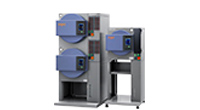Power Cycle Test System
![]()
Equipment Overview
Power devices (MOSFET, Si-IGBT, Diode) have become indispensable in a variety of fields, including green energy and electric vehicles (EVs). In particular, advanced power devices such as SiC-MOSFET (silicon carbide) enable high-efficiency power conversion with low loss, which reduces energy consumption and improves performance, contributing to making the power device itself and passive components more compact. These smaller sizes increase the amount of heat radiated per unit of surface area and volume, making heat management more difficult. These devices have the issue of heat dissipation caused by the accumulation of heat, so it is essential to add appropriate countermeasures for heat from the early stage of design, and evaluate the device’s reliability.
Evaluating the characteristics of heat dissipation enables a more profound understanding of the device’s issues in terms of heat design and can lead to improvements in long-term reliability.
ESPEC’s Power Cycle Test Systems provide precise, repeatable evaluation of heat dissipation characteristics and package degradation, enabling engineers to identify design risks and improve device reliability.
The power cycle test involves applying a large current to the power device and heating the device until its temperature (Tvj) reaches the target temperature. After the target temperature is reached, the large current is interrupted, and the power device is cooled down with chiller water or air until the low-limit temperature is reached. This temperature stress is repeated to apply thermal stress to the device. The deterioration over time of the durability of the entire package structure, from the wire bonding to the chip and from the chip to the cooling plate, is evaluated.
Features
-
- Cooling system with a selection of cooling water and an air-cooled system
- Proposes a cooling jig that matches the device’s shape and heat generation
- Proprietary constant current unit that prevents overshoot during stress current application, and controls the surge voltage during interruption
- Calculation of TCR measurement α and β value
- Types of tests: Fixed-duration power cycle test and Temperature-targeted power cycle test (Tvj, Tc)
- Application modes of constant current control and constant power control
- Devices for Evaluation (Example)
-
- Discrete package or Module type with SiC-MOSFET, Si-IGBT and Diode
Test mode
| Characteristic measurement | TCR measurement |
|---|---|
| Types of tests * Able to select from constant current/constant power in each test |
Fixed-duration power cycle test |
| Temperature-targeted power cycle test (Tvj, Tc) |
Test method (Standard)
Please scroll horizontally to look at table below.
| Test item | Test method (Standard) | Breakdown mode |
|---|---|---|
| Power cycle test | AQG324:QL-01(PCsec) AQG324:QL-02(PCmin) |
Breakdown in the heat dissipation path Disconnection in the wire junction |
Recommended products for customers viewing this product
- Contact us
- Customer Support Desk
Measurement & Evaluation Systems / Semiconductor-related Equipment
-
Measurement & Evaluation Systems
- Electro-chemical Migration Evaluation System(Leakage Current Evaluation System)
- High Voltage Bias Insulation Resistance Evaluation System
- Capacitor Leakage Test System
- High Temperature Reverse Bias Test System
- TDDB (Time-Dependent Dielectric Breakdown) Evaluation System
- Conductor Resistance Evaluation System
- Electromigration Evaluation System
- PV Thermal-Bias Combo Test System
- Semiconductor Parametric Test System
- Capacitor / Inductor Temperature Characteristic Evaluation System
- PV I-V Evaluation System (PV Thermal-Light Combo Test System)
- Power Cycle Test System
- Semiconductor-related Equipment





